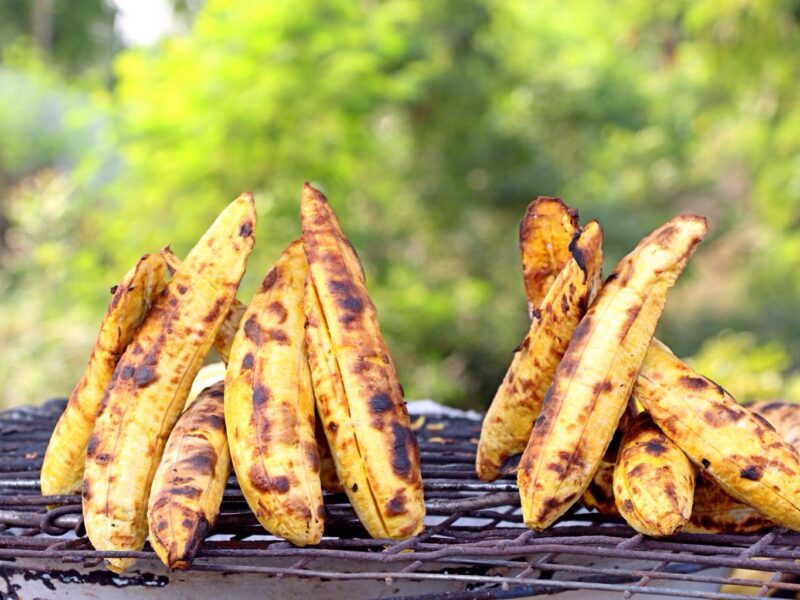Introduction: In the bustling streets of Nigeria, amidst the hustle and bustle of daily life, there’s a culinary gem that stands out for its simplicity, flavor, and universal appeal – boli. This beloved street food, consisting of roasted plantains, has captured the hearts and taste buds of Nigerians from all walks of life. Whether enjoyed as a quick snack on the go or savored as a satisfying meal, boli embodies the essence of Nigerian street food culture. In this exploration, we delve into the world of boli, celebrating its origins, preparation methods, flavor profiles, and cultural significance.

Section 1: Origins and Cultural Significance 1.1. Historical Roots:
- The origins of boli can be traced back to the streets of Nigeria, where it emerged as a popular street food option among vendors and food enthusiasts.
- While the exact origins of boli are uncertain, roasted plantains have long been a staple of Nigerian cuisine, dating back to ancient times when they were roasted over open fires and enjoyed as a nutritious and flavorful snack.
1.2. Cultural Significance:
- Boli holds deep cultural significance in Nigerian society, serving as a symbol of street food culture, communal dining, and culinary innovation.
- It is often enjoyed during social gatherings, festivals, and sporting events, where vendors set up makeshift grills and serve piping hot boli to eager patrons.
Section 2: Preparation and Ingredients 2.1. Plantain Selection:
- The key ingredient in boli is ripe plantains, which are chosen for their sweetness, firmness, and suitability for roasting.
- Vendors carefully select ripe plantains with yellow skins that yield slightly to pressure, indicating optimal ripeness and flavor.
2.2. Roasting Process:
- The plantains are washed and peeled, then skewered onto long metal skewers or sticks to facilitate even cooking.
- They are then roasted over an open flame or charcoal grill, turning occasionally to ensure uniform cooking and caramelization.
2.3. Flavor Enhancements:
- While boli can be enjoyed on its own, it is often served with flavorful accompaniments that elevate its taste and texture.
- Common accompaniments include spicy pepper sauce, made from a blend of hot peppers, onions, tomatoes, and spices, as well as groundnut (peanut) sauce, a creamy and savory dip made from roasted peanuts, spices, and oil.
Section 3: Flavor Profiles and Variations 3.1. Sweet and Savory:
- Boli strikes the perfect balance between sweet and savory flavors, with the natural sweetness of the ripe plantains complementing the smoky char from the grilling process.
- The addition of spicy pepper sauce or groundnut sauce adds a savory kick and depth of flavor that enhances the overall eating experience.
3.2. Regional Variations:
- While boli is enjoyed across Nigeria, there are regional variations that reflect local tastes and preferences.
- In some regions, boli is served with additional toppings such as grated coconut, honey, or even grilled meats for a heartier meal option.
Section 4: Social and Culinary Impact 4.1. Street Food Culture:
- Boli epitomizes the vibrant street food culture of Nigeria, where vendors set up makeshift grills and serve up delicious snacks to hungry passersby.
- The aroma of roasting plantains fills the air, drawing crowds of eager customers who eagerly await their turn to indulge in this beloved street food delicacy.
4.2. Culinary Innovation:
- While boli may seem simple in its preparation, it represents a form of culinary innovation and creativity that transforms humble ingredients into a flavorful and satisfying snack.
- Vendors often experiment with different grilling techniques, seasoning blends, and accompaniments to create unique variations of boli that cater to diverse tastes and preferences.
Section 5: Health Considerations and Nutritional Benefits 5.1. Nutrient-Rich Plantains:
- Plantains, the main ingredient in boli, are a rich source of essential nutrients such as potassium, dietary fiber, and vitamins A and C.
- They are naturally gluten-free and provide sustained energy, making them a nutritious and satisfying snack option.
5.2. Moderation and Balance:
- While boli can be enjoyed as part of a balanced diet, it is important to consume it in moderation, especially for individuals watching their calorie intake or managing certain health conditions.
- Opting for grilled plantains without excessive oil or sugary toppings can help minimize the calorie and fat content while maximizing the nutritional benefits.
Conclusion: In conclusion, boli stands as a shining example of Nigeria’s vibrant street food culture, culinary ingenuity, and communal dining traditions. From its humble origins on the streets of Nigeria to its widespread popularity across the country and beyond, boli has captured the hearts and taste buds of food enthusiasts everywhere. Whether enjoyed as a quick snack on the go or savored as a satisfying meal, boli represents more than just a culinary delight – it is a celebration of Nigerian cuisine, culture, and creativity. So, the next time you find yourself craving a flavorful and satisfying snack, why not indulge in a delicious serving of boli and savor the taste of Nigeria’s street food sensation?










